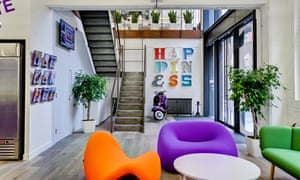Step inside G Adventures’ office in Clerkenwell, London, and you may never want to leave. A welcome sign illuminates visitors’ names as they enter the office, and the décor is far from bland – Beatles- and royals-themed meeting rooms await. The travel company’s staff get one complementary family trip per year, and every Friday employees from all sides of the business are encouraged to hang out and drink beers in its downstairs meeting room.
“The light airy space, bright colours and happy vibe make the office a fun and vibrant place to come to work,” says Casey Mead, global PR lead at G Adventures. “Knowing we have the freedom to chill out with others in our communal area, or take some space in one of the London phone booths or egg chairs, makes the office a great place to be.”
A strong company culture can be important in helping productivity and creating a happy workforce. With a table football and ping-pong room to hang out in, Alphabet’s office in Farnborough, Hampshire, has two of the staple ingredients seen in trendy offices the world over. But it’s not just the fun stuff that draws people in. The mobility and fleet-leasing company has recently introduced an intrapreneur lab, in which staff can turn their business ideas into a reality, with the help of company resources. Since its launch in October, it has seen 110 applications from staff and produced 74 new ideas.
“We put a lot of time and energy into meeting the personal and professional requirements of our 400-plus UK employees,” says Adam Lupton, HR director at Alphabet. “Highly engaged employees are more effective, more dedicated and more passionate – exactly the sorts of people our customers want to deal with. Our ultimate goal is to have happy, healthy and motivated employees – it’s a win for the business and a win for staff.”
Lydia Fairman, an HR and resourcing specialist, says today’s workers are looking for opportunity, recognition and inclusivity from an employer. “Family-friendly policies are vital if employers want to have a diverse and engaged workforce, and they should also make the most of technology to enable people to work remotely.”
At Aisle Eight’s office in east London, they’ve gone to great lengths to create a workplace that feels homely. The owners’ two dachshunds and French bulldog visit several times a week, and every Friday at 5pm a different employee of the PR agency gets to show off their bottle-juggling skills and whip up cocktails for their colleagues.

And it doesn’t end in the office, either – the company splashes out on annual summer and Christmas away days, exploring cities such as Barcelona and Amsterdam. “We wanted to create a culture where our team would look forward to coming to work, and that meant working hard to build the right team who all shared the same vision and had the same work ethics,” says Aisle Eight co-founder Lauren Stevenson.
Beyond a good salary and job satisfaction, today’s jobseekers look for a good company culture, where employee happiness is just as important as increasing profits.
In practice, this means flexitime and employee wellbeing are a given, and strong parental-leave policies, where new mums and dads are supported to take the necessary time off, are an essential part of the company.
At feedback platform TruRating, management focus on creating a culture of openness and equality. “I don’t think there is anyone who would be afraid to speak up if they thought something could be done better,” says product manager David Atkinson. “We all have share options too, which creates a very real sense of ownership.”
Creating a strong company culture takes time and effort, but it’s worth the effort. Happy staff have been found to be 12% more productive than unhappy employees, so there’s incentive to create an enviable company culture – with or without the ping-pong table.
Ten popular policies at work
- Offering staff flexibility over the hours they work.
- Working from home – increasingly possibility across many professions, thanks to advances in cloud computing and browser-based software ... and if it’s workable, companies should be offering it.
- Giving staff access to social media at work. Restricting access implies a lack of trust.
- A strong anti-harassment policy – so employees feel safe and happy when they come to work.
- Providing staff with a level of autonomy in their work.
- Encouraging and supporting employees’ development and training requirements.
- Unlimited holiday, or a minimum of 28 days off per year.
- Recognising work-life balance – that means discouraging everyone from emailing outside work hours.
- Free gym membership or lunchtime exercise classes – to help keep staff healthy and happy.
- Feeding them. Whether it’s as low-key as a bowl of fresh fruit on a Monday, or as indulgent as breakfast everyday, complementary food is always a winner.


